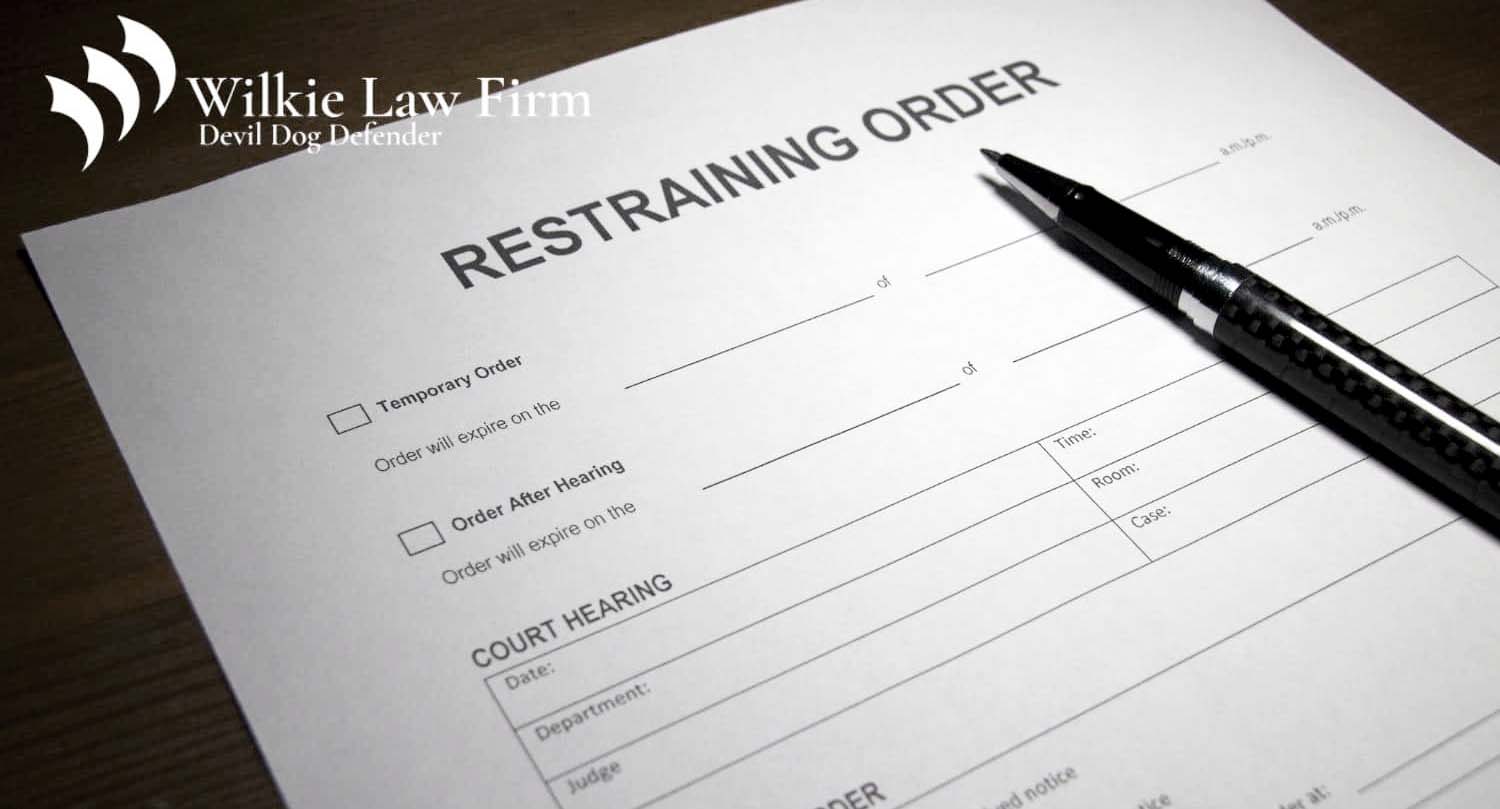North Carolina Domestic Violence Protective Order
Aggressive Domestic Crimes Attorney Serving Jacksonville, Wilmington, and Surrounding Areas.
Home » Domestic Crimes » Domestic Violence Protective Order
Practice Areas
Under North Carolina law, victims of domestic violence may obtain what is called a “Domestic Violence Protective Order,” more commonly referred to as a restraining order. Once in effect, a domestic violence protective order (DVPO) provides protection to victims from their alleged abuser, prohibiting any contact between the two parties.
Domestic crime charges in North Carolina are extremely serious, and a protective order can influence everything from custody provisions to property rights. If you’ve been served with a domestic violence protective order, contact North Carolina domestic crimes attorney Aden Wilkie at the The Wilkie Law Group today for experienced legal counsel and unparalleled defense.
What is a Protective Order?
A protective order may also be referred to as a “civil no-contact order” or a “50B order” in North Carolina, as it can be found in Chapter 50B under North Carolina Criminal Law. There are two different types of domestic violence protective orders available for petitioners: an ex-parte temporary protective order and a final DVPO. If a judge finds the defendant poses a serious and imminent danger to the victim and/or their child, they may grant an ex parte order, which provides the victim with immediate protection. This court order is typically only in effect until a court hearing takes place and a judge can grant a “permanent” protective order.
A final or permanent domestic violence protective order may only be issued after a hearing has taken place. This will be in effect for up to one year but may be extended to two years under certain circumstances. The protective order bans all abusive behaviors towards a petitioner, including direct or indirect contact as well as threats, stalking and harassment, and assault.
Who Can File a Protective Order?
In order to file a DVPO, the petitioner must share a personal relationship with the alleged abuser. As such, petitioners typically include spouses, family members, roommates, cohabitants, co-parents, or current or former intimate partners. It also protects any children or family of the alleged victim.
More specifically, § 50B-1(b) defines a “personal relationship” as parties who:
- Are current or former spouses;
- Are persons of the opposite sex who live together or have lived together;
- Are related as parents and children, including others acting in loco parentis to a minor child, or as grandparents and grandchildren. (An aggrieved party may not obtain an order of protection against a child or grandchild under the age of 16);
- Have a child in common;
- Are current or former household members;
- Are persons of the opposite sex who are in a dating relationship or have been in a dating relationship. (A dating relationship is one wherein the parties are romantically involved over time and on a continuous basis during the course of the relationship. A casual acquaintance or ordinary fraternization between persons in a business or social context is not a dating relationship.)
Why Might a Protective Order Be Issued?
There are a few valid reasons a judge might go forward with issuing a domestic violence protective order against an alleged abuser. Under North Carolina’s definition of domestic violence, the defendant must have:
- Attempted to cause bodily injury, or intentionally caused bodily injury.
- Placed the victim and/or their family in fear of imminent serious bodily injury or continued harassment that rises to such a level as to inflict substantial emotional distress.
- Or committed any of the following acts:
- Forcible rape;
- Statutory rape;
- Forcible sexual offense;
- Unlawful sexual activity;
- Sexual abuse or battery.
The accused may also be required to surrender possession of any and all firearms to the sheriff’s department if court officials find any of the following factors to be true:
- The use or threatened use of a deadly weapon by the defendant or a pattern of prior conduct involving the use or threatened use of violence with a firearm against persons;
- Threats to seriously injure or kill the aggrieved party or minor child by the defendant;
- Threats to commit suicide by the defendant;
- Serious injuries inflicted upon the aggrieved party or child abuse committed by the defendant.
How Does a Protective Order Work?
A domestic violence protective order is filed through civil court but may also lead to criminal charges should the defendant violate the order. However, the protective order itself is not considered a criminal charge and therefore will not appear on the defendant’s record unless actual charges are brought.
When a protective order is issued, the defendant is barred from coming within a certain distance of the petitioner. They are also prohibited from any sort of contact, whether by telephone, email, communication through family members, and any other direct or indirect contact.
Protections that may be found within a protective order include the following:
- The accused can’t threaten, harass, follow, or otherwise interfere with the victim or their children.
- The accused cannot contact the victim, any family members, or children.
- The victim is granted temporary custody of minor children and must establish temporary visitation rights.
- The victim is granted rights over personal property, including any shared vehicles, household goods, animals/pets, etc. (The abuser’s personal belongings are not included.)
- Use of a home is granted to the victim and the accused is barred from living in or visiting the home. Otherwise, the abuser must provide suitable alternative housing.
- The accused cannot visit the victim’s workplace, school, children’s school or daycare, or other places connected to the victim.
- The accused is ordered to pay temporary spousal support as well as pay temporary child support in cases where a minor child or children are involved.
- The accused is ordered to pay attorney’s fees.
- Any other prohibitions or requirements the court deems necessary to protect the victim.
The court may also order that the defendant attends an abuser’s treatment program within 60 days of the issuance of the order.
How Long is a Restraining Order?
As previously mentioned, an ex parte temporary protective order generally lasts until a hearing date for a permanent protective order may be held. These orders are specifically reserved for cases where the judge finds the petitioner to be in immediate danger of the abuser. Once an ex parte order is issued, a court hearing should be held within 10 days of the issuance (or within seven days from the date of service of process on the other party, whichever occurs later). The court date for the full court hearing should have priority on the court’s calendar.
If/when a final domestic violence protective order is issued, it will be in effect for one year. However, for good cause, the court may choose to extend the protective order for another year (two-year maximum) if the petitioner files for an extension of time before the current order expires.

What Happens if You Violate a Domestic Violence Protective Order?
An immediate arrest may occur if a domestic violence protective order is violated. In this case, the original petitioner must submit a “move for order to show cause in a DVPO.” If the court rules against the defendant, he or she is in civil contempt and fines and prison time are both applicable.
In North Carolina, violations of restraining orders warrant a Class A1 misdemeanor, but further violations of the protection order can increase the penalties significantly. Just under felony allegations in severity, an A1 misdemeanor charge is the highest level of a misdemeanor offense, carrying a maximum sentence of 150 days (five months) in prison.
There are four felony charges involving DVPO infractions in addition to the initial A1 misdemeanor violation, including:
- Committing a felony while a restraining order is in effect;
- Being in possession of a deadly weapon and violating the order;
- Entering into a safe house where the protected person lives;
- A third instance of violating an order after two misdemeanor violation convictions. (If this is the person’s third or subsequent violation of a no-contact order, he or she might be charged with a Class H felony and face a term of up to 3.25 years in prison.)
If you’ve been charged with violating a domestic violence protective order in North Carolina, it’s imperative that you seek the legal guidance of a skilled Jacksonville criminal defense attorney like Aden Wilkie. At The Wilkie Law Group, our dedicated legal team will help protect your rights and fight for the best possible outcome for your unique situation.
Experienced Jacksonville Domestic Violence Defense Lawyer
Restraining orders in North Carolina are not to be taken lightly. If you have been served a domestic violence protective order, obtaining qualified legal aid can significantly benefit your case and potentially your entire future. Your Jacksonville domestic violence defense attorney can help you navigate the court process while vigorously protecting your rights and defending your case in court.
Call our legal team today at (910) 333-9626 or reach out to us online for a consultation to discuss these allegations and your legal options moving forward.
Hire The Best
It is crucial for you to have an experienced North Carolina domestic crimes attorney on your side. Contact us today at 910-333-9626 for a consultation and decide for yourself if The Wilkie Law Group is the best choice for you.






